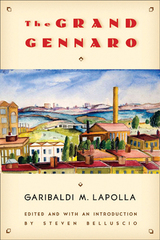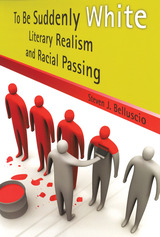2 books by Belluscio, Steven

The Grand Gennaro
Belluscio, Steven
Rutgers University Press, 2009
An illiterate Calabrian in southern Italy owes money to his church and mayor. He skips town for the bustling streets of New York. Meeting an old friend, a fellow immigrant, he thanks him for help getting settled, and then steals his money. With a new parcel of wealth, he materializes from a small-time laborer into a big-time entrepreneur, soon becoming the tyrant of the local Italian American community. By pluck, luck, and unscrupulous business practices, this cunning character "makes America." There are riches, pleasure, and the beautiful Carmela. Then trouble. Comeuppance. Ambush. Revenge.Twenty-first century popular culture? Not at all.
The Grand Gennaro, a riveting saga set at the turn of the last century in Italian American Harlem, reflects on how youthful acts of cruelty and desperation follow many to the grave. A classic in the truest sense, this operatic narrative is alive once again, addressing the question: How does one become an "American"?
[more]

To Be Suddenly White
Literary Realism and Racial Passing
Steven J. Belluscio
University of Missouri Press, 2006
To Be Suddenly White explores the troubled relationship between literary passing and literary realism, the dominant aesthetic motivation behind the late-nineteenth and early-twentieth-century ethnic texts considered in this study. Steven J. Belluscio uses the passing narrative to provide insight into how the representation of ethnic and racial subjectivity served, in part, to counter dominant narratives of difference.
To Be Suddenly White offers new readings of traditional passing narratives from the African American literary tradition, such as James Weldon Johnson’s The Autobiography of an Ex-Coloured Man, Nella Larsen’s Passing, and George Schuyler’s Black No More. It is also the first full-length work to consider a number of Jewish American and Italian American prose texts, such as Mary Antin’s The Promised Land, Anzia Yezierska’s Bread Givers, and Guido d’Agostino’s Olives on the Apple Tree, as racial passing narratives in their own right. Belluscio also demonstrates the contradictions that result from the passing narrative’s exploration of racial subjectivity, racial difference, and race itself.
When they are seen in comparison, ideological differences begin to emerge between African American passing narratives and “white ethnic” (Jewish American and Italian American) passing narratives. According to Belluscio, the former are more likely to engage in a direct critique of ideas of race, while the latter have a tendency to become more simplistic acculturation narratives in which a character moves from a position of ethnic difference to one of full American identity.
The desire “to be suddenly white” serves as a continual point of reference for Belluscio, enabling him to analyze how writers, even when overtly aware of the problematic nature of race (especially African American writers), are also aware of the conditions it creates, the transformations it provokes, and the consequences of both. Byexamining the content and context of these works, Belluscio elucidates their engagement with discourses of racial and ethnic differences, assimilation, passing, and identity, an approach that has profound implications for the understanding of American literary history.
[more]
READERS
Browse our collection.
PUBLISHERS
See BiblioVault's publisher services.
STUDENT SERVICES
Files for college accessibility offices.
UChicago Accessibility Resources
home | accessibility | search | about | contact us
BiblioVault ® 2001 - 2024
The University of Chicago Press









